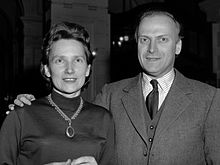Hephzibah Menuhin
Hephzibah Menuhin-Hauser (born May 20, 1920 in San Francisco , † January 1, 1981 in London ) was an American-Jewish pianist and human rights campaigner. She was the sister of the world-famous violinist Yehudi Menuhin and the pianist, painter and philosopher Yaltah Menuhin.
Life
Hephzibah's father, Moshe Menuhin , who studied with a rabbi and was an anti-Zionist writer, came from a respected rabbinical dynasty. Hephzibah Menuhin began playing the piano at the age of four and, like her brother, turned out to be a musical prodigy.
Studies led her to Basel with Rudolf Serkin and in Paris with Marcel Ciampi . In 1933 she recorded her first record with Yehudi ( Mozart's Sonata in A major KV 526), which was awarded the Candid Prize as the best record of the year. They made their debut as a duo in 1934 at the Salle Pleyel in Paris and they continued to perform together in the following decades. Hephzibah also made a name for himself in solo concerts in numerous European and American cities; Among other things, she played the Australian premiere of Bartók's 2nd piano concerto . In 1951 she played with Yehudi at the opening of the Royal Festival Hall in London; there was her last concert appearance in 1979, again with her brother.
In 1938, at the age of 17, she married the Australian cattle breeder Lindsay Nicholas, heir to the maker of the Australian "aspirin", whom she accompanied to his Terrinallum property in West Victoria. There she gave birth to her two sons. Her brother Yehudi had recently married Lindsay's sister Nola. Both marriages ended in divorce.
In 1955, Hephzibah Menuhin married Richard Hauser , who belonged to the Quaker religious community. The marriage produced a daughter. The family moved to London in 1957, where they took in a foster son. In England she founded the Institute for Human Rights and Responsibilities and the Center for Group Studies to encourage and support students according to their possibilities. The Menuhin-Hauser family home was considered a refuge for those who were subjected to human rights abuse. Their stated goal was to help all minorities around the world.
documentary
Australian director Curtis Levy met Hephzibah Menuhin, who was a friend of his mother's, as a child. In 1998 he made a 75-minute film called Hephzibah . In the documentary, for example, Yehudi Menuhin tells how he and Hephzibah got to know their respective spouses. Levy built in private film recordings and photos and had Hephzibah's letters read aloud by an actress. Both private and public appearances as a pianist are reproduced.
literature
- Jacqueline Kent: To Exacting Heart. The Hephzibah Menuhin Story. Penguin Group Australia, 2008, ISBN 978-0-6700-7117-3 ,
Web links
- Short biography
- Photograph of Hephzibah Menuhin with her family (1951)
Individual evidence
- ↑ Marcel Ciampi Short biography of Charles Timbrell
- ↑ Aspro biotechnology-innovation.com.au
- ↑ Three excerpts from the film Hephzibah (1998): clip 1 (2:49 min.), Clip 2 (2:44 min.), Clip 3 (1:20 min.)
| personal data | |
|---|---|
| SURNAME | Menuhin, Hephzibah |
| ALTERNATIVE NAMES | Menuhin-Hauser, Hephzibah |
| BRIEF DESCRIPTION | American-Jewish pianist and human rights campaigner |
| DATE OF BIRTH | May 20, 1920 |
| PLACE OF BIRTH | San Francisco |
| DATE OF DEATH | January 1, 1981 |
| Place of death | London |
